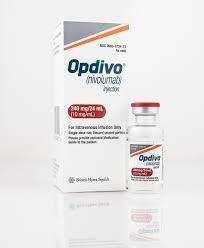Nivolumab Disease Interactions
There are 5 disease interactions with nivolumab.
Nivolumab (applies to nivolumab) hepatic impairment
Moderate Potential Hazard, Moderate plausibility. Applicable conditions: Liver Disease
There are no data available on the use of nivolumab-containing products in patients with severe hepatic impairment or autoimmune liver disease. No dose adjustment is recommended for patients with mild or moderate hepatic impairment during use of IV nivolumab; data not available for subcutaneous nivolumab. Monitor liver enzymes at baseline and periodically during therapy. Therapy with nivolumab-containing products may cause immune-mediated hepatitis and/or hepatotoxicity.
Nivolumab (applies to nivolumab) pneumonitis
Moderate Potential Hazard, Moderate plausibility. Applicable conditions: Pleuropulmonary Infection, History - Radiation Therapy
Use of nivolumab-containing products can cause immune-mediated pneumonitis. The incidence of pneumonitis is higher in patients who have received prior thoracic radiation.
PD-1/PD-L1 inhibitors (applies to nivolumab) HSCT
Moderate Potential Hazard, Moderate plausibility. Applicable conditions: Bone Marrow Transplantation
Fatal and other serious complications can occur in patients who receive allogeneic hematopoietic stem cell transplantation (HSCT) before or after being treated with a programmed death receptor-1/ligand-1 (PD-1/PD-L1) blocking antibody. Transplant-related complications include hyperacute graft-versus-host disease (GVHD), acute GVHD, chronic GVHD, hepatic veno-occlusive disease after reduced intensity conditioning, and steroid-requiring febrile syndrome (without an identified infectious cause). These complications may occur despite intervening therapy between PD-1/PD-L1 blockade and allogeneic HSCT. It is recommended to follow patients closely for evidence of transplant-related complications and intervene promptly. The benefit versus risks of treatment with a PD-1/PD-L1 blocking antibody before or after an allogeneic HSCT should be considered.
PD-1/PD-L1 inhibitors (applies to nivolumab) myasthenia gravis
Moderate Potential Hazard, Moderate plausibility.
Myasthenic syndrome/myasthenia gravis (including exacerbation) has been reported with the use of programmed death receptor-1/ligand-1 (PD-1/PD-L1) blocking antibodies. Care should be exercised when using PD-1/PD-L1 blocking antibodies in patients with myasthenia gravis.
PD-1/PD-L1 inhibitors (applies to nivolumab) organ transplant
Moderate Potential Hazard, Moderate plausibility.
Solid organ transplant rejection and other transplant (including corneal graft) rejection have been reported with the use of programmed death receptor-1/ligand-1 (PD-1/PD-L1) blocking antibodies. Care should be exercised when using PD-1/PD-L1 blocking antibodies in patients who have received a solid organ or other transplant.
Switch to professional interaction data
Nivolumab drug interactions
There are 594 drug interactions with nivolumab.
More about nivolumab
- nivolumab consumer information
- Check interactions
- Compare alternatives
- Reviews (142)
- Side effects
- Dosage information
- During pregnancy
- Drug class: anti-PD-1 and PD-L1 monoclonal antibodies (immune checkpoint inhibitors)
- Breastfeeding
- En español
Related treatment guides
Drug Interaction Classification
| Highly clinically significant. Avoid combinations; the risk of the interaction outweighs the benefit. | |
| Moderately clinically significant. Usually avoid combinations; use it only under special circumstances. | |
| Minimally clinically significant. Minimize risk; assess risk and consider an alternative drug, take steps to circumvent the interaction risk and/or institute a monitoring plan. | |
| No interaction information available. |
See also:
Alecensa
Alecensa (alectinib) is an oral kinase inhibitor that may be used to treat certain types of ...
Yervoy
Yervoy (ipilimumab) is a cancer treatment used for lung cancer, melanoma, renal cell carcinoma ...
Lumakras
Lumakras is used to treat KRAS G12C-mutated non-small cell lung cancer (NSCLC) or colorectal cancer ...
Enhertu
Enhertu is a treatment for breast cancer, stomach cancer, and non-small cell lung cancer with HER2 ...
Opdivo Qvantig
Opdivo Qvantig is used to treat adults with melanoma, non-small cell lung cancer, renal cell ...
Rybrevant
Rybrevant is used to treat advanced non-small cell lung cancer (NSCLC) in adults that has certain ...
Keytruda
Keytruda is used to treat melanoma, non-small cell lung cancer, malignant pleural mesothelioma ...
Opdivo
Opdivo is used to treat many cancers, such as melanoma, non-small cell lung cancer, malignant ...
Hydrea
Hydrea is used for chronic myelogenous leukemia, head and neck cancer
Further information
Always consult your healthcare provider to ensure the information displayed on this page applies to your personal circumstances.


